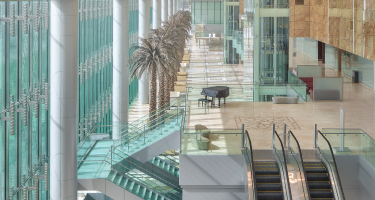The Hernia Surgery Program at Cleveland Clinic Abu Dhabi is comprised of experienced surgeons who put Patients First. Our experts specialize in advanced laparoscopic and robotic procedures, as well as traditional open surgery, for the treatment of abdominal wall and hernia conditions for adults over the age of 14.
Our expertise ranges from common inguinal and umbilical hernia operations to laparoscopic repair of diastasis recti (separation of the rectus muscles). Taking a tailored approach to ensure the best possible outcome, our multidisciplinary team assesses each patient and selects the most appropriate surgical technique.
In collaboration with surgeons from our Plastic Surgery Program, we offer reconstructive surgery for complex abdominal wall reconstructions. Abdominal wall reconstruction surgery is required when the lining of the abdominal wall has become weak due to recurring (repeating) hernias.
We also perform advanced surgical procedures, including techniques with muscle flaps, for patients who have had disfiguring abdominal wall defects, often from previous surgeries that had complications due to weakness in the patient’s abdomen.
What We Treat
Hernia
Hernias are one of the most common reasons for surgery that occur worldwide. A hernia occurs when an organ that is usually held into place by muscles and tissue protrudes through an opening in the tissue that holds it into place. Hernias vary in complexity and the types of hernias include inguinal and umbilical hernias, as well as large and potentially disfiguring ventral and incisional hernias. All hernias require urgent medical attention. We provide surgical treatment for congenital (present at birth) or acquired hernias, such as:
- Inguinal & femoral hernias: Hernias of the groin or thigh.
- Umbilical hernias: Hernias of the navel area.
- Spigelian hernias: Hernias of the lower abdomen.
- Epigastric hernias: Hernias of the upper abdomen.
- Obturator hernias: Hernias of the pelvic floor.
- Hiatal hernias: Hernias that form when the stomach pushes up through the diaphragm.
- Diaphragmatic hernias: Hernias involving the diaphragm and organs in the chest that form as the result of a birth defect.
Learn more about hernias here.
Conditions of the Abdominal Wall
Ventral or incisional hernias are hernias that occur in the abdominal wall (layers of muscles in the abdomen) due to complications from previous surgeries or hernia repair operations. In some cases, patients who have had previous surgery or postoperative complications develop infections or other problems that may lead to the failure of the abdominal wall to heal properly. These circumstances include:
- Diastasis Recti: A common condition in pregnant and postpartum women, where the rectus abdominis muscles (abdominal muscles) separate and make the belly bulge.
- Large or recurrent hernias of the abdominal wall
- Incarcerated or strangulated hernias
- Hernias at stoma sites, such as a hernia at a colostomy
- Hernias with overlying tissue loss or infection
- Open abdominal wall defects
- Catastrophic abdominal events
Each patient who visits the Digestive Disease Institute for hernia or abdominal wall issues is assessed and treated by a multidisciplinary team including nutritionists, an obesity medicine consultant, physical therapists, wound care experts and a highly specialized group of plastic and abdominal surgeons dedicated to improving the quality of life and outcomes of patients with abdominal wall hernias.

